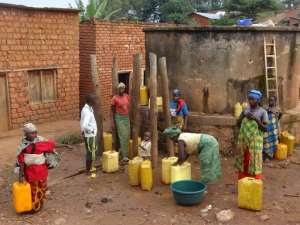
Rwesero (Burundi) (AFP) - People in Burundi's hilltop village of Rwesero know well the impact of war after decades of conflict, but fear of fresh violence is growing after rebel battles ahead of elections this year.
In the hills around Rwesero last week, Burundi's army clashed with well equipped rebel fighters, with soldiers claiming some 100 insurgents were killed.
The army has said the rebels had planned a major offensive to destabilise the country ahead of elections due in May and June.
"We are tired," said Saidi Bukuru, a teacher at the primary school in the village. "All the evil that has happened to us here on this hill, I cannot think of it."
Around him, dozens of villagers voice similar concerns, keen to stem what they fear is mounting violence.
For the people of Rwesero, some 70 kilometres (45 miles) north of the capital Bujumbura, the fighting brought back grim memories of the 1993-2006 civil war. The region has also seen a string of killings and attacks by gunmen in recent years.
The village is located on a strategic route from lawless regions of neighbouring eastern Democratic Republic of Congo to the thick forests of Kibira. The jungles have often served as a launchpad for rebel attacks.
Rwesero and surrounding regions were a stronghold of the ethnic Hutu CNDD-FDD, rebels in the civil war but now the ruling party led by President Pierre Nkurunziza.
Nkurunziza, in power since 2005, is expected to run for a third term in office in the small nation in Africa's Great Lakes region, still reeling from 13-years of civil war.
- Five day gun battle -
The area was a major battle zone during war, and Bukuru said all his uncles were killed during fighting there in 1991.
"I grew up watching war," he said.
Around him, women in colourful clothes and children fetch water from a well pock marked with bullet scars from recent battles.
Nearby, farmers spread their products for sale -small piles of peanuts, avocados and tomatoes.
The farming region had been largely peaceful, until the rebels arrived last week.
"When we told they had come... we immediately put our belongings on our heads and ran," said 21-year old farmer Anitha Nzeyimana, her baby on her back. "We heard the sound of guns, so we fled to the town."
Villagers said they saw dozens of rebels dressed in mismatched military fatigues -- but well equipped and heavily armed with rifles, machine guns and rocket launchers.
In small columns, the rebels climbed the steep path up to the village in silence, but leaving the residents alone, said one man, asking not to be named because he feared for his safety.
Government troops dug in on surrounding hills, with the crackle of gunfire marking the start of a ferocious battle lasting five days.
The rebels later fled with the army in pursuit.
For now, the village has returned to calm. Two soldiers could be seen wandering down the street unarmed, hands in pockets, as music blasted out from a small bar.
Villagers praise the army.
"The soldiers told us to evacuate women and children, while able-bodied men stayed behind to guard their property so it was not looted," said Jean Obed Ihorihoze, a student.
But many fear fresh attacks after returning to their homes.
"We hear rumours there is another group of 50 rebels," said Gerard Ndiho, a 30-year old motorbike taxi driver.
"People have said there was a group of rebels hiding in a small wood on a hill top," said one of the soldiers. "We went to check out, but we did not see anyone."
One woman spoke for many when she voiced exasperation at the endless volatility.
"We do not want conflict," she said. "We are tired of seeing the warmongers come to fight here in Rwesero as if it were a cursed village."




 Election 2024: Ghanaians will vote to erase Akufo-Addo’s horrifying legacy – Nii...
Election 2024: Ghanaians will vote to erase Akufo-Addo’s horrifying legacy – Nii...
 BP killed ex-Weija-Gbawe MCE – Tina Mensah reveals
BP killed ex-Weija-Gbawe MCE – Tina Mensah reveals
 Limited voter registration exercise: NDC slams EC over mass technical challenges
Limited voter registration exercise: NDC slams EC over mass technical challenges
 UK, America will one day come to Ghana to borrow Akufo-Addo to be their presiden...
UK, America will one day come to Ghana to borrow Akufo-Addo to be their presiden...
 EOCO returns fire at OSP over Cecilia Abena Dapaah’s money laundering case
EOCO returns fire at OSP over Cecilia Abena Dapaah’s money laundering case
 Anti-corruption endeavours must be rooted in systems, investigations and prosecu...
Anti-corruption endeavours must be rooted in systems, investigations and prosecu...
 We’ve not introduced 1% cybersecurity levy on banking transactions – BoG
We’ve not introduced 1% cybersecurity levy on banking transactions – BoG
 EU hits out at sidelining of Chad election observers
EU hits out at sidelining of Chad election observers
 ‘Be calm; we’re having engagements on new fee implementation’ — KNUST SRC assure...
‘Be calm; we’re having engagements on new fee implementation’ — KNUST SRC assure...
 Bawumia is compassionate, unique politician without corruption tag — Miracles Ab...
Bawumia is compassionate, unique politician without corruption tag — Miracles Ab...
